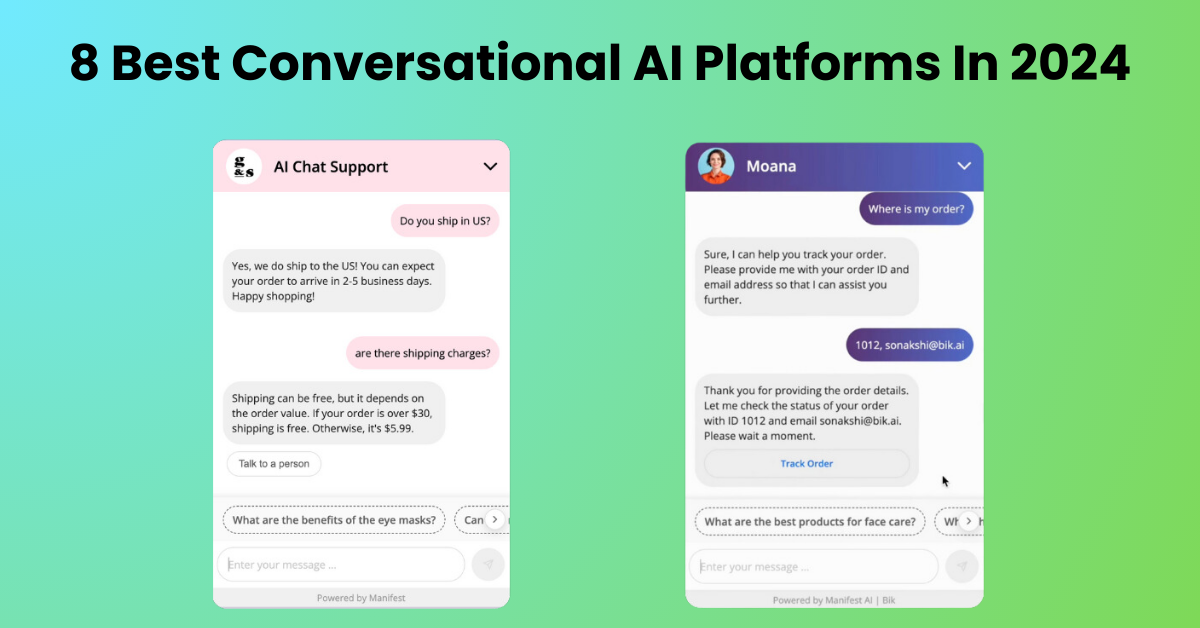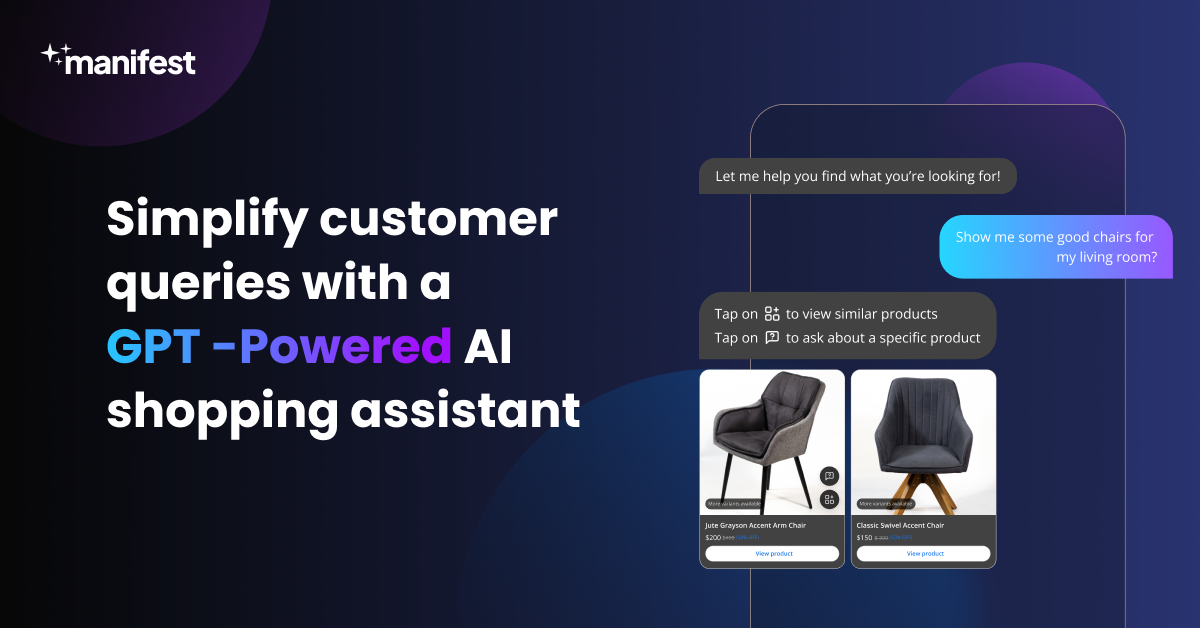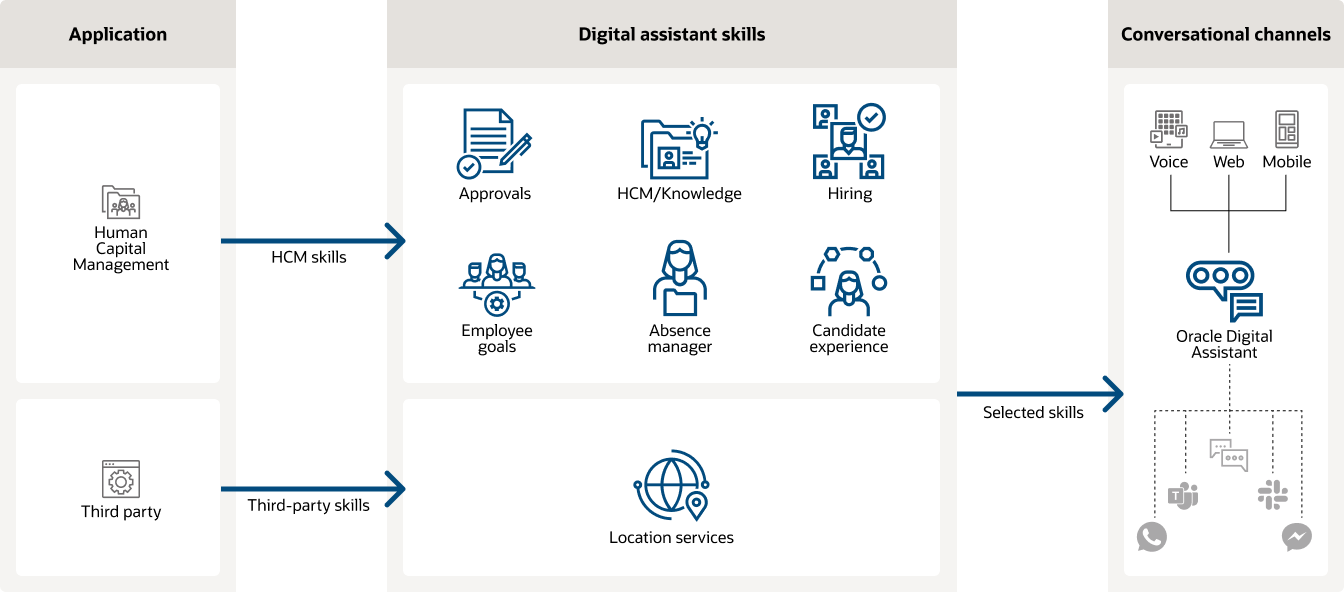8 Best Conversational AI Platforms In 2024

Conversational AI is not a sci-fi dream in 2024. It's completely changing how we communicate with companies, from making appointments to receiving product recommendations. However, it can be overwhelming to choose the best conversational AI platform because there are so many options available.
Your one-stop guide to understanding the fascinating field of enterprise conversational AI platforms is this blog post. The 8 best conversational AI platforms of 2024 will be revealed, catered to your individual requirements and financial constraints. We can assist small business owners looking for a chatbot for customer support or large enterprises considering AI for employee training.
Overview Conversational AI platforms
For chatbots and voice assistants, conversational AI platforms functions similarly to a virtual brain. It interprets your words, anticipates your intentions, and conducts smooth, natural conversations using state-of-the-art technology like natural language processing. Consider conversational AI software a toolkit for creating AI friends who can perform jobs, respond to inquiries, and even provide you with entertainment.
8 Best Conversational AI Platforms list
Here are the conversational platforms examples with their key features and pros & cons:
IBM Watson Assistant

IBM Watson Assistant is a powerful conversational AI platform provider that allows you to build smart chatbots and voice assistants. It uses advanced natural language processing (NLP) to understand user intent and generate natural-sounding responses, creating engaging and helpful interactions.
Key Features:
- Advanced NLP: Understands complex questions, intents, and natural language.
- Multi-language support: Interact with users in over 50 languages.
- Custom integrations: Connect with various platforms and services for seamless workflows.
- Robust analytics: Track bot performance and user behavior for continuous improvement.
- Dialog builder: Create conversational flows with ease, even without coding.
- Voice support: Enable voice interactions for a more natural experience.
- Security and compliance: Built with rigorous security and compliance standards.
Pros:
- Highly customizable: Create unique and intelligent chatbots for your specific needs.
- Powerful AI engine: Delivers accurate and insightful responses for complex tasks.
- Scalable and reliable: Handle high volumes of interactions with ease.
- Wide range of features: A comprehensive platform for all your conversational AI needs.
- Trusted brand: IBM's reputation ensures quality and security.
Cons:
- Steeper learning curve: Requires some technical knowledge to get started.
- Higher pricing: Can be expensive compared to some competitors, especially for enterprise plans.
- Limited free tier: The free tier has limited features and functionality.
- Complexity for advanced customization: Building highly complex bots might require coding expertise.
Manifest AI

Manifest AI is one of the relatively new but innovative conversational AI solutions designed specifically for Shopify stores. It leverages GPT-3 technology to power a multi-modal AI shopping assistant that helps customers throughout their purchase journey, from browsing to checkout. Think of it as an engaging AI companion for your online store!
Key Features:
- Multi-modal: Interacts with customers through text, voice, and video for a personalized experience.
- Emotion recognition: Understands customer sentiment and tailors responses accordingly.
- Contextual awareness: Remembers past interactions and adapts dialogue based on context.
- Personalized recommendations: Suggests relevant products and offers based on individual preferences.
- Product knowledge: Holds extensive knowledge about your products and answers customer questions effectively.
- Conversational nudges: Guides customers towards purchase completion with gentle prompts and suggestions.
- Analytics and reporting: Provides insights into customer behavior and chatbot performance.
Pros:
- Engaging customer experience: Creates a natural and interactive shopping environment.
- Increased conversion rates: Guides customers towards purchase and reduces cart abandonment.
- Reduced customer service workload: Handles FAQs and basic inquiries, freeing up human agents for complex questions.
- Personalization at scale: Provides personalized recommendations and interactions for each customer.
- Easy to set up and use: Designed for non-technical users, with drag-and-drop interface and pre-built templates.
- Shopify integration: Seamless integration with your Shopify store for smooth data flow and performance tracking.
Cons:
- Relatively new platform: May have fewer established features and integrations compared to older players.
- Focus on Shopify: Currently tailored for Shopify stores, not suitable for other e-commerce platforms.
Cognigy.AI

Cognigy.AI is a leading enterprise conversational AI tools used to build and deploy intelligent virtual agents across various channels like webchat, voice, SMS, and mobile apps. It focuses on automating customer service and employee communication with its powerful AI capabilities and extensive pre-trained skills.
Key Features:
- Contact Center Automation: Streamline customer service with AI-powered agents that handle routine inquiries, schedule appointments, and route complex issues to human agents.
- Omnichannel Engagement: Deliver consistent and personalized experiences across diverse channels like webchat, voice calls, messaging platforms, and even Facebook Messenger.
- Multi-language Support: Interact with customers in over 100 languages, catering to a global audience.
- AI-powered Routing: Intelligently route customer inquiries to the most suitable agent or virtual agent based on intent, context, and agent availability.
- Pre-trained Industry Skills: Leverage a library of pre-trained skills for banking, insurance, e-commerce, and other industries, accelerating bot development and ensuring industry-specific knowledge.
- Advanced NLP: Understand complex user inquiries and natural language expressions with advanced natural language processing techniques.
- Analytics and Reporting: Gain insights into bot performance, customer behavior, and identify areas for improvement.
- Extension Framework: Extend the platform's capabilities by developing custom integrations and functionalities.
Pros:
- Excellent for contact centers: Automates routine tasks, reduces wait times, and improves customer satisfaction.
- Powerful AI engine: Delivers intelligent and insightful conversations, handling complex inquiries effectively.
- Omnichannel capabilities: Provides consistent experiences across diverse platforms, reaching customers where they are.
- Pre-trained skills: Save time and resources with industry-specific skills and ready-to-use conversation flows.
- Highly customizable: Adapt the platform to your specific needs and workflows with customization options and extensions.
- Security and compliance: Built with robust security features and meets industry compliance standards.
Cons:
- Can be expensive: Pricing can be higher than some competitor platforms, especially for larger deployments.
- Complex setup and learning curve: Setting up and customizing advanced features might require technical expertise.
- Less intuitive for beginners: The interface may not be as user-friendly for those new to conversational AI platforms.
- Focus on enterprise: Primarily caters to larger organizations with complex contact center needs, may not be ideal for smaller businesses.
Kore.ai

Kore.ai is a comprehensive conversational AI platform that empowers businesses to design, build, and deploy intelligent virtual assistants for a range of purposes. It caters to both customer and employee experiences, aiming to streamline interactions and automate tasks across diverse channels like webchat, messaging platforms, voice assistants, and social media.
Key Features:
- Automation Workflows: Automate repetitive tasks and processes, improving efficiency and agent productivity.
- Omnichannel Deployment: Deliver consistent and seamless experiences across various channels, where your customers and employees are.
- Built-in Reporting: Track bot performance, user behavior, and identify areas for improvement with in-depth analytics and reporting tools.
- Conversational Analytics: Gain insights into how users interact with your bots, optimize workflows, and personalize conversations.
- No-code Interface: Build and manage bots with a drag-and-drop interface and pre-built templates, no coding required.
- AI-powered Search: Leverage the power of generative AI to provide users with accurate and personalized search results based on their intent and context.
- Integrations: Connect Kore.ai with your existing business systems and platforms for seamless data flow and enhanced functionality.
Pros:
- Excellent for automating tasks and workflows: Boost efficiency and reduce human intervention for repetitive tasks.
- Strong analytics and reporting: Gain valuable insights to optimize bot performance and user experience.
- User-friendly interface: Simple drag-and-drop tools make it easy for non-technical users to build and manage bots.
- Omnichannel reach: Engage customers and employees across multiple platforms, increasing accessibility and convenience.
- Versatility: Suitable for customer service, employee assistance, internal information portals, and more.
- Generative AI integration: Gain access to cutting-edge search capabilities powered by large language models.
Cons:
- Limited free tier: The free tier has limited features and functionality, restricting testing capabilities.
- May not be ideal for highly complex conversations: While capable of handling advanced tasks, might require more effort for specific use cases compared to specialized platforms.
- Pricing varies based on needs: The pricing structure can be complex and depend on your specific requirements, making it less upfront compared to some competitors.
Avaamo.ai

Avaamo.ai is a conversational AI platform built with customer experience in mind. It leverages AI and machine learning to create personalized and intelligent virtual assistants for customer service, sales, and marketing interactions.
Key Features:
- AI-powered Sentiment Analysis: Understands customer emotions and adjusts responses accordingly, creating a more empathetic and personalized experience.
- Personalized Interactions: Recommends relevant conversational AI products, services, and solutions based on individual customer preferences and past interactions.
- Data-driven Insights: Gain valuable data on customer sentiment, satisfaction, and key conversation drivers to improve your overall customer experience.
- Conversation Optimization Tools: Analyze dialogue flows and identify areas for improvement, ensuring a consistently positive and efficient customer journey.
- Omnichannel Engagement: Deliver seamless interactions across different channels like webchat, voice calls, messaging platforms, and social media.
- Multilingual Support: Interact with customers in over 29 languages, catering to a global audience.
- Pre-built Industry Skills: Leverage a library of pre-trained skills for specific industries like banking, insurance, and retail, accelerating deployment and ensuring industry-specific knowledge.
Pros:
- Focus on customer experience: Creates personalized and empathetic interactions, leading to improved satisfaction and loyalty.
- Strong data-driven insights: Provides valuable data to understand customer behavior and optimize conversations.
- Conversation optimization tools: Continuously improve chatbot performance and ensure consistent quality.
- Omnichannel engagement: Reach customers where they are and deliver consistent experiences across platforms.
- Pre-built industry skills: Reduce development time and leverage industry-specific knowledge for faster implementation.
- Multilingual support: Expand your reach and cater to a global audience.
Cons:
- Higher cost compared to some competitors: Pricing can be higher than some more general-purpose conversational AI platforms.
- Limited integrations with certain platforms: Integration options with specific platforms might be limited compared to broader-spectrum platforms.
- Focus on customer service: While capable of handling other functions, Avaamo excels in customer service and might not be the best choice for highly specific use cases outside of this area.
Amazon Lex

Amazon Lex is a cloud-based conversational AI service from Amazon Web Services (AWS) that lets you build chatbots and voice assistants with natural language understanding (NLU) capabilities. It's a great option for beginners and those seeking a cost-effective solution, especially within the AWS ecosystem.
Key Features:
- Cost-effective: Affordable pricing model based on pay-per-use, ideal for low-volume interactions.
- Cloud-based: Quick and easy deployment and scaling on the AWS platform.
- Seamless integration with AWS services: Connect Lex with other AWS services like DynamoDB for data storage and Lambda for custom code execution.
- Pre-built skills: Access a library of pre-built skills for common tasks like booking appointments or answering FAQs, accelerating development.
- Multi-language support: Interact with users in over 50 languages, expanding your reach.
- Voice support: Enable voice interactions for a more natural user experience.
- Simple interface: Drag-and-drop tools and pre-written templates make bot building accessible even for non-technical users.
- Analytics and reporting: Gain insights into bot performance and user behavior for continuous improvement.
Pros:
- Affordable: A budget-friendly option for low-volume needs, particularly within the AWS ecosystem.
- Easy to use: Simple interface and pre-built features make it accessible for beginners.
- Fast deployment: Cloud-based and integrates seamlessly with AWS services for quick launch.
- Voice support: Enables natural voice interactions for a better user experience.
- Scalability: Handles increased traffic with ease on the AWS infrastructure.
Cons:
- Less customization: Compared to more advanced platforms, Lex offers less flexibility for complex use cases or deep NLP tasks.
- Limited built-in features: Requires integration with other AWS services or custom code for advanced functionalities.
- Security considerations: Sharing data with AWS might raise concerns for some users.
- Focus on text interactions: Primarily text-based, voice support might not be as robust as on dedicated voice platforms.
Oracle Digital Assistant

Oracle Digital Assistant (ODA) is a conversational AI platform designed specifically for organizations already using Oracle applications. It allows you to build intelligent chatbots and voice assistants that seamlessly integrate with your existing Oracle systems, streamlining workflows and enhancing user experiences.
Key Features:
- Strong Security Features: Built with the security and compliance standards of the Oracle ecosystem, ensuring data protection and trust.
- Integration with Oracle Applications: Connects seamlessly with various Oracle systems like CRM, ERP, and HCM, leveraging existing data and functionalities.
- Task Automation Capabilities: Automates repetitive tasks and processes, boosting efficiency and freeing up human resources.
- Voice Support: Enable voice interactions for hands-free operation and a more natural user experience.
- Pre-built Skills and Templates: Access a library of pre-built skills and templates for common tasks within the Oracle environment, accelerating bot development.
- Conversational Analytics: Gain insights into bot performance and user behavior to optimize interactions and identify improvement areas.
- Customizable Interface: Build and manage bots with a customizable interface and tools, catering to specific needs and workflows.
Pros:
- Ideal for Oracle users: Seamless integration with your existing Oracle systems streamlines processes and leverages existing data.
- Strong security and compliance: Ensures data protection and meets industry standards, crucial for enterprise use.
- Task automation: Boosts efficiency and reduces human workload for repetitive tasks.
- Voice support: Adds a natural and convenient interaction option for users.
- Pre-built skills and templates: Speeds up development and provides a foundation for specific use cases.
Cons:
- Limited to Oracle environment: Not ideal for organizations outside the Oracle ecosystem or seeking broader functionalities.
- Steeper learning curve: Understanding the intricacies of Oracle integrations might require specialized knowledge.
- Pricing not publicly available: Pricing structure is not public, making cost comparison with other platforms difficult.
- May not be as intuitive for beginners: The interface and workflow might be less user-friendly for those unfamiliar with Oracle systems.
Microsoft Bot Framework

Microsoft Bot Framework is a popular open-source framework for building and deploying intelligent chatbots and voice assistants across diverse channels. It provides a robust toolkit and flexible environment, empowering developers of all skill levels to create engaging and functional conversational AI experiences.
Key Features:
- Open-source framework: Accessible and customizable, allowing for tailored solutions without vendor lock-in.
- Developer-friendly environment: Extensive documentation, resources, and community support, simplifying development and troubleshooting.
- Rich communication channels: Connects with a wide range of channels like webchat, messaging platforms, social media, and voice assistants.
- Modular architecture: Build bots with a combination of pre-built components and custom code, catering to specific needs.
- AI connectors: Integrate with diverse AI services like Azure Cognitive Services for advanced functionality like vision and speech recognition.
- Analytics and reporting: Track bot performance, user behavior, and identify areas for improvement.
- Strong documentation and community: Extensive resources and active community support for learning and problem-solving.
Pros:
- Highly customizable: Build bots for your specific needs and integrate with diverse platforms and services.
- Cost-effective: Open-source framework is free to use, with additional costs only for specific resources like AI services.
- Large community and resources: Access to extensive documentation, tutorials, and a vibrant developer community for support.
- Flexibility and control: Maintain control over your bot's development and data, avoiding vendor lock-in.
- Scalable and robust: Handles high volumes of interactions and integrates seamlessly with Azure infrastructure.
Cons:
- Requires coding skills: Building complex bots requires programming knowledge, though low-code options are available.
- Steeper learning curve: Understanding the framework and setting up integrations might require technical expertise.
- Management and hosting: Managing bot infrastructure and resources can be complex for some users.
- Potentially slower development: Building custom bots from scratch can take longer compared to platforms with pre-built features.
Conclusion
It can be difficult to choose the finest conversational AI platform, but with our in-depth analysis of the top 8 choices for 2024, you'll be well-prepared to make an informed choice. There's a platform that fits your demands, whether your priorities are budget-friendly solutions, simple interfaces, or powerful natural language processing. Recall that the best option depends on your industry, technical proficiency, and personal objectives. It is important to take into account aspects like as future scalability, customization choices, and user experience when investing in a platform that promotes successful conversations. So, go forward with confidence on your AI journey, knowing that you have the means and knowledge to realize conversational AI's revolutionary promise in 2024 and beyond.

.png)
